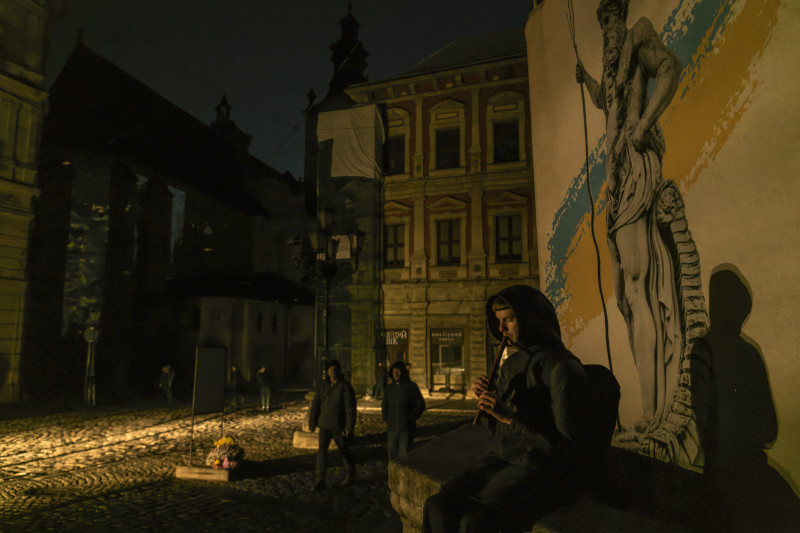Day 6 : Tuesday 28 February
Hear our voice, O Lord, according to your faithful love.
| Isaiah 55.10-11 | Psalm 34.11-18 | Matthew 6.7-15 |

A man plays on the flute in the center of Lviv during a blackout after a Russian missile attack. 15 Nov 2022. Photo by Maxym Marusenko
. . . . . . . . . . . . . .
from: Eternal echoes, by John O'Donohue. Perennial, 1999, p. 209–11.
The Prison of Guilt
It is awful to feel guilty. Your mind and spirit become haunted. You keep on returning to some action or event in the past.
. . .
There is hardly any life that is not shadowed in some place by guilt. There is always some little corner of even the most immaculate cupboard where there is the stain, if not the splinter, of a hidden skeleton. No one lives a perfect life; there are places where we have been weak, ignorant, and blind and the results have been damaging and destructive. The person who never made a mistake never made anything. We would be ashamed and humiliated if these failures were paraded before the public. Every life has some more or less burdensome secret. When you visit the corner in your heart where the secret lives, the guilt comes alive. When your burden of guilt is truthful to what actually happened and to your part and responsibility in it, then the burden is appropriate. This is a very important condition, and one that is difficult to judge. Sometimes we feel guilty about things in the past that should hold no guilt for us. Because we feel bad about something, we exaggerate our part in it and retrospectively ascribe more power and freedom to ourselves than we actually had in the actual situation.
Guilt in itself is useless. It belongs to the past, and the past is over and gone. Regardless of how guilty you feel, you cannot return to that time, enter the situation, and act as honourably as you now wish you had then. One of the great developments in modern culture is the way we have emancipated ourselves from the gnawing feeling of guilt that tormented past generations. When the God and the system were harsh, and culture was more uniform, good and innocent people felt scrupulously guilty about nothing. Now we are at the other extreme, where people in our rapid consumerist culture have lost all ability to feel guilt. When there is no capacity for warranted and proportionate guilt, some terrible deadening of human sensibility has taken place. When we treat a person wrongly or badly, when we hurt or damage someone, when we allow awful things to happen around us or in our name and we remain silent, when we buy goods that are products of the slavery and oppression of the poor, when we support institutions and policies that blight the hidden lives of those who have no voice, we definitely should feel a haunting guilt that should eat into our complacency and render our belonging uneasy.
When personal guilt in relation to a past event becomes a continuous cloud over your life, you are locked in a mental prison. You have become your own jailer. Although you should not erase your responsibility for the past, when you make the past your jailer, you destroy your future. It is such a great moment of liberation when you learn to forgive yourself, let the burden go, and walk out into a new path of promise and possibility. Self-compassion is a wonderful gift to give yourself. You should never reduce the mystery and expanse of your presence to a haunted fixation with something you did or did not do. To learn the art of integrating your faults is to begin a journey of healing on which you will regain your poise and find new creativity. Your soul is more immense than any one moment or event in your past. When you allow guilt to fester and reduce you like this, it has little to do with guilt. The guilt is only an uncomfortable but convenient excuse for your fear of growth.
Alleluiah / Angnus Dei, from a Ukrainian outdoor Easter service in Lviv, 2022, in the midst of war. Cond. Sergiy Yakobchuk. Written by Michael W. Smith.
May God our Redeemer show us compassion and love. Amen.